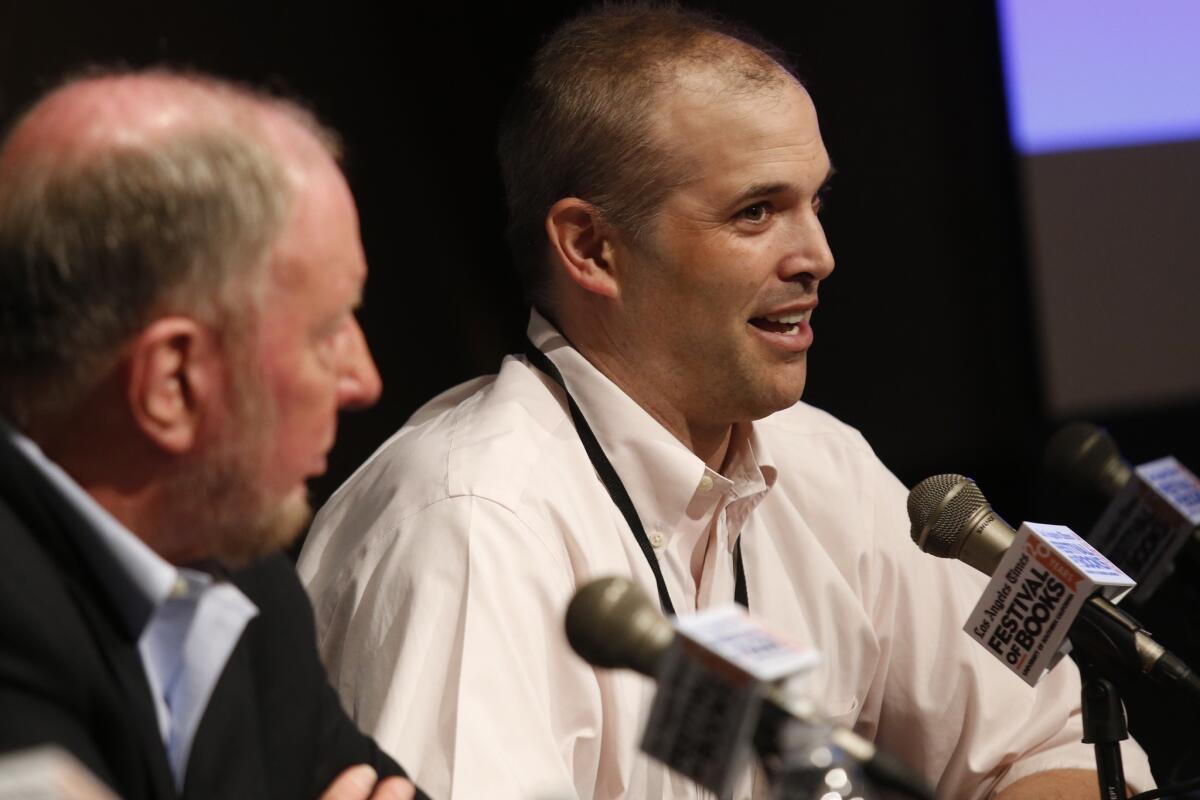Festival of Books: Matt Taibbi, Steve Lopez on socio-economic clout

Matt Taibbi speaks during the panel “America’s Rich and Poor: Looking at the Financial Gap” at the Los Angeles Times Festival of Books at USC.
Close readers of Steve Lopez’s column in the Los Angeles Times may have noticed that, in the last year, he has written about a big problem.
First, there were the laid-off employees of Boeing, moving from salaries of $70,000 a year to hourly wages of $13 or less. Then the guy in Echo Park, who lives in one van and repairs shoes in the other.
Or there’s the guy in Beverly Hills, who buys a perfectly nice—OK, very, very, very nice house—for $35 million, and then he tears it down to build a new one.
FULL COVERAGE: FESTIVAL OF BOOKS
All are examples of what Lopez called the same vexing problems: inequality, extremes in the local economy, and the near extinction of middle-class jobs. And joining the columnist Saturday at the Los Angeles Times Festival of Books to discuss the issue were three of inequality’s sharpest critics.
Matt Taibbi became legend when, in covering the 2008 financial crisis for Rolling Stone, he famously compared the robber barons of Goldman Sachs to “a great vampire squid wrapped around the face of humanity, relentlessly jamming its blood funnel into anything that smells like money.”
In his comments Saturday, Taibbi recalled how a group of journalists in 2011 realized that, despite in some cases laundering nearly a billion dollars, in only one instance had any of the giant financial firms seen even a single employee face criminal prosecution.
#LITIDOL: AUTHORS DISCUSS THEIR LITERARY IDOLS
Talking to Lopez, Taibbi recalled how he decided to dive deeper, to determine who it was exactly that the justice system actually did prosecute.
What he discovered, in writing “The Divide: American Injustice in the Age of the Wealth Gap,” was that the young men and women, targeted for minor infractions, were almost uniformly people of color.
For banks, meanwhile, the government had crafted settlements “specifically so they could remain in business, be profitable, and everyone keeps their jobs… which is exactly what they don’t do for individuals,” Taibbi said, referring to the excessive fines, court appearances, and even jail time less-wealthy citizens face after infractions as minor as a broken taillight.
If Taibbi’s effort focused on the justice system, in his new book, “Our Kids,” Harvard professor Robert D. Putnam documented with a photographer’s eye a level of sociological segregation in America that he calls “a virtual apartheid”—and how there is perhaps no better lens for understanding this divide than our schools.
Mere 10 miles apart, Putnam explained, are the Orange Country high schools of Fullerton and Santa Ana. “On paper, they look extraordinarily similar, with the same dollars spent per kid, the same student-teacher ratio, the same number of counselors, and the same physical plant,” Putnam said.
“But the kids [in Fullerton] are rich kids, coming from well-to-do backgrounds, and when they come to school they bring their parents’ expectations, resources, a lot of extras. When the kids come to school in Santa Ana, they bring… experiences with abuse and homicidal gang violence.”
USC law professor Edward D. Kleinbard, meanwhile, described the mountains of “depressing data” he used to write “We Are Better Than That” (Oxford), a book that seeks to reframe the conversation about taxing into one about spending, about how we need a smarter government to restore our social safety net, and how all of this serves to end what he calls a “shameful inequality.”
Preparing to write the book, Kleinbard recalled encountering what passed as policy analysis, the pseudo economics, and the narcissistic work of writers he called “market triumphalists,” who mainly desired to keep what was theirs.
Putnam urged a historical look. There had been a time when America was marked by wealth inequalities just as dire. Then an 1890 book called “How the Other Half Lives” debuted, forcing the 19th-century elite to ask themselves: Do we want to live in a world like this?
As the three panelists noted extensively, the extremes of a crueler century are again the norm, and with them come structural problems that can be indeed met with structural solutions.
Not fixing our society, Putnam argued, could mean we’d be “writing off the possible contribution of 23 million children in our nation.” “I don’t want America to be Sweden,” he said, “ I want America to be America.”
“We’re better than this,” Kleinbard says.
As for what to do, Taibbi called for prosecuting white-collar crimes and reassessing how painfully we police the poor. Kleinbard suggested we increase taxes, and that we think of money spent as an investment in our future.
Putnam wanted above all for inequality to be the most important issue discussed in the 2016 general election
“I want every candidate to have an answer. What are you going to do about this?”
Check out the Festival of Books schedule for this weekend.
MORE FROM THE FESTIVAL OF BOOKS:
Can social media solve the social justice problem?
‘Books spawn change,’ Times’ Austin Beutner says
Follow the books section on Twitter @latimesbooks and Facebook
More to Read
Sign up for our Book Club newsletter
Get the latest news, events and more from the Los Angeles Times Book Club, and help us get L.A. reading and talking.
You may occasionally receive promotional content from the Los Angeles Times.








